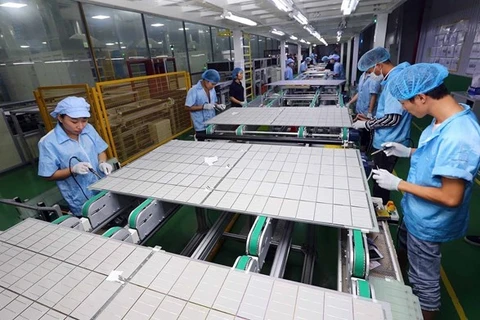Hanoi (VNA) – Increasing labour productivity is an important factor to promote economic growth in the long run, and is a prerequisite for Vietnam to narrow its development gap with other regional countries and fulfill the goal of becoming a developed country with high income by 2045, said Deputy Minister of Planning and Investment Tran Quoc Phuong.
After 30 years of renewal, Vietnam has recorded important achievements in socio-economic development, with less dependence on natural resources, crude oil export and low-cost workforce, and stepped up the application of scientific and technological advances and innovation, Phuong said at a conference in Hanoi on November 29 to seek ways to promote labour productivity for sustainable growth in Vietnam.
He said that successes in the past have prompted the country to look to the goals of national industrialisation and modernisation, and improving the people’s living conditions.
Vietnam has also defined key factors to realise the goals, with special attention paid to maintaining a high growth rate basing on improving labour productivity and nurturing a renovated economy in order to increase the competitiveness of the economy in association with ensuring independence and self-reliance, stressed the official.
Meanwhile, Dang Duc Anh, Vice Director of the Central Institute of Economic Management (CIEM), said that Vietnam’s labour productivity rose 2.5 times from 70.3 million VND per labourer in 2011 to 171.8 million VND in 2021. The labour productivity growth rate reached 6% in the 2011-2020 period.
However, Vietnam has still been left behind by many regional countries in the field, and the gap is being widened, he noted, adding that the labour productivity increase has yet to be equal among industries and regions.
Although a fundamental policy framework for the improvement of labour productivity was issued in the 2011-2021 period, the policies and institutions in the field have yet to be completed and synchronous, effecting the efficiency of coordination among parties in implementing relevant solutions, Anh said.
Dr. Vo Tri Thanh, Director of the Institute for Branding and Competition Strategy, said key barriers for businesses to boost productivity include uncertainty in technology investments, poor innovation capacity reflected in poor management quality, a lack of necessary skills of the workforce, and a shortage of capital.
Participants at the event agreed that the building of a national programme on labour productivity improvement is a crucial need in the current period, which is expected to enable Vietnam to enhance the competitiveness of the economy, catch up with and surpass other countries in the region.
According to the programme, labour productivity is expected to grow 6.5-7.5% each year./.
After 30 years of renewal, Vietnam has recorded important achievements in socio-economic development, with less dependence on natural resources, crude oil export and low-cost workforce, and stepped up the application of scientific and technological advances and innovation, Phuong said at a conference in Hanoi on November 29 to seek ways to promote labour productivity for sustainable growth in Vietnam.
He said that successes in the past have prompted the country to look to the goals of national industrialisation and modernisation, and improving the people’s living conditions.
Vietnam has also defined key factors to realise the goals, with special attention paid to maintaining a high growth rate basing on improving labour productivity and nurturing a renovated economy in order to increase the competitiveness of the economy in association with ensuring independence and self-reliance, stressed the official.
Meanwhile, Dang Duc Anh, Vice Director of the Central Institute of Economic Management (CIEM), said that Vietnam’s labour productivity rose 2.5 times from 70.3 million VND per labourer in 2011 to 171.8 million VND in 2021. The labour productivity growth rate reached 6% in the 2011-2020 period.
However, Vietnam has still been left behind by many regional countries in the field, and the gap is being widened, he noted, adding that the labour productivity increase has yet to be equal among industries and regions.
Although a fundamental policy framework for the improvement of labour productivity was issued in the 2011-2021 period, the policies and institutions in the field have yet to be completed and synchronous, effecting the efficiency of coordination among parties in implementing relevant solutions, Anh said.
Dr. Vo Tri Thanh, Director of the Institute for Branding and Competition Strategy, said key barriers for businesses to boost productivity include uncertainty in technology investments, poor innovation capacity reflected in poor management quality, a lack of necessary skills of the workforce, and a shortage of capital.
Participants at the event agreed that the building of a national programme on labour productivity improvement is a crucial need in the current period, which is expected to enable Vietnam to enhance the competitiveness of the economy, catch up with and surpass other countries in the region.
According to the programme, labour productivity is expected to grow 6.5-7.5% each year./.
VNA

























